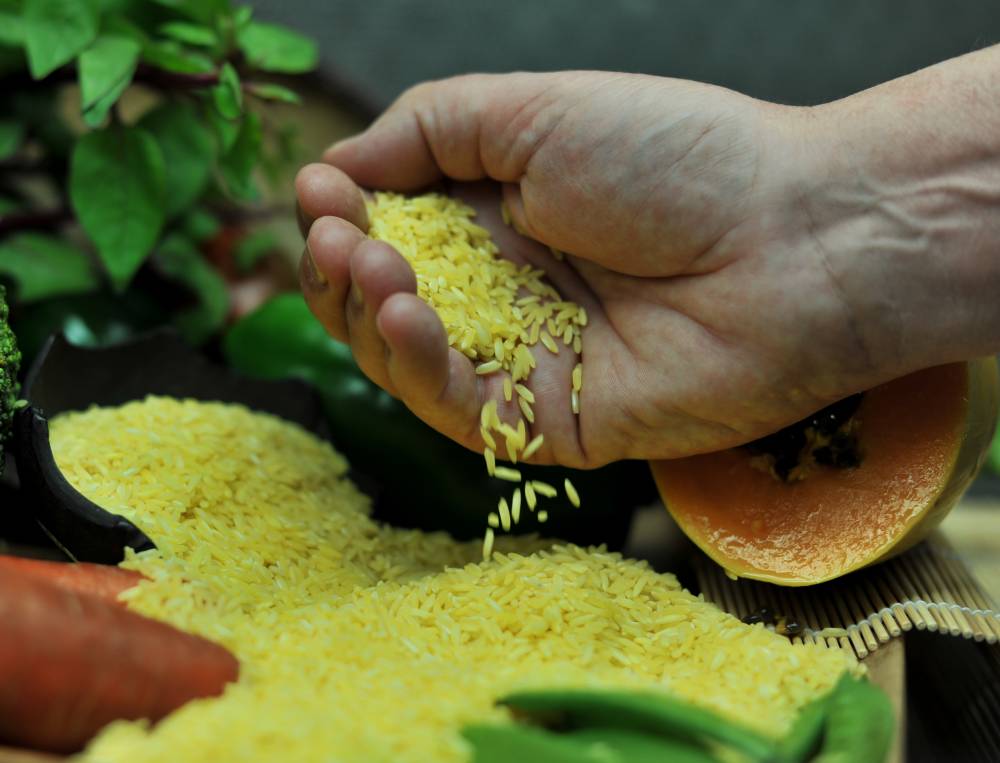Biz groups to gov’t: Biotech crops feed more people

Golden Rice is unique because it contains beta carotene, which gives it a golden color. (IRRI PHOTO)
Five big business groups have asked the government to focus on helping biotech crops, especially since a recent court ruling stopped the selling of genetically modified rice and eggplant.
“Biotechnology in food and agriculture has played a major role in facilitating the feeding of the growing world population in more recent decades while providing improved livelihoods for those engaged in the farming of these crops,” read the joint statement.
The organizations are: Foundation for Economic Freedom, Japanese Chamber of Commerce and Industry of the Philippines Inc., American Chamber of Commerce of the Philippines Inc., Makati Business Club and Management Association of the Philippines.
They said biotechnology has improved the livelihoods of people, citing the benefits of higher productivity, reduced losses due to plant diseases, and improved health through reduced dependence on pesticides and herbicides.
READ: CA stops commercial growing of GMO crops
These groups said many food products today rely on genetic engineering, with 576,000 hectares of agricultural lands in the Philippines planted with genetically engineered corn as of February last year.
“The inability to tend to or sell these planted crops will mean thousands of tons of potentially wasted products. Particularly in the case of rice, our country cannot afford any wastage as a net importer of this household staple,” they said.
Last month, the Court of Appeals issued a halt order on the commercial propagation of Golden Rice and Bt (Bacillus thuringiensis) eggplant, citing the lack of “full scientific certainty” on the impact of these food products.
The groups warned that the extremely hot weather that has scorched thousands of hectares of rice farms may reduce local yield and productivity.
“It is also notable that the country relies on the importation of various biotech commodities, such as corn and soybean, which are critical macro-ingredients for the local livestock and poultry industry. Halting the importation of these commodities would materially affect these vital sectors providing a major part of Filipinos’ daily protein requirements,” they said.
They added it could dent the credibility of the country in the international trading system should shipments be canceled for lack of permits. Transaction costs are seen to rise along with insurance premiums due to the growing risk of trading with the Philippines.
“Ultimately, this will drive food inflation higher at a time when we have been trying to avoid a repeat of the elevated food prices we have experienced over the past two years,” the groups said.
“Urgent times require urgent action. We need a whole-of-government approach—the executive, the legislative, and most crucial of all, the judiciary [branches]—to work together in supporting biotechnology crops to solve food security that is causing malnutrition and child stunting across the country, thus endangering our future generation.” INQ
READ: Extreme drought hits Cebu City: Farmer decides ‘free harvest’ for tomatoes
Disclaimer: The comments uploaded on this site do not necessarily represent or reflect the views of management and owner of Cebudailynews. We reserve the right to exclude comments that we deem to be inconsistent with our editorial standards.




